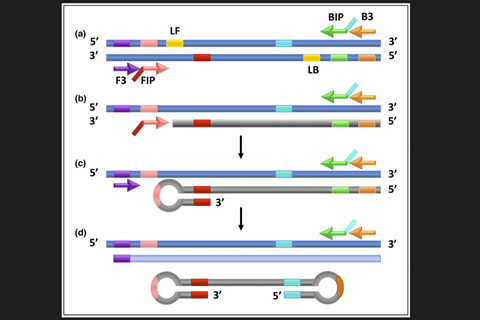A new testing method can detect five key antimicrobial resistance markers in water samples in less than an hour.
The rapid and sensitive loop-mediated isothermal amplification (LAMP) assay was developed by researchers at the School of Veterinary Medicince at the University of Surrey in collaboration with researchers at the University of Galway.
Their paper, ‘Rapid culture-independent loop-mediated isothermal amplification (LAMP) detection of antimicrobial resistance markers from environmental water samples’ has been accepted for publication in Microbial Biotechnology, an Applied Microbiology International publication.

Antimicrobial resistance (AMR) is a worldwide problem affecting human medicine, animal medicine and the environmental sector. Approximately 60% of human infectious diseases are zoonotic, thus linking animals with humans, according to lead author Dr Marwa Mohsen Hussain Ali Hassan.
“The environment plays a major role in spreading infectious diseases and antimicrobial resistance. For example, contaminated and poor-quality water sources represent a significant risk for the spread of genes that encode for antibiotic resistance,” she says.
“Several antibiotic resistant genes have been detected from wastewater treatment plants and surface water, leading to an increased risk of further AMR gene transfer and persistence in the environment.
“However, standard detection techniques to assess the contamination level of environmental water samples are time consuming, labour intensive and require trained personnel. Therefore, we developed a rapid and sensitive diagnostic method that can facilitate detection of five important AMR markers in environmental water samples.”
The team made use of publicly available genome sequences of four key pathogens, E. coli, Klebsiella, Salmonella enterica and Acinetobacter, to study the prevalence of antibiotic resistance, and identified five markers of medical and veterinary relevance which are considered by the World Health Organization to require urgent intervention.
“We then developed a diagnostic technique called LAMP - loop mediated isothermal amplification - which is advantageous in its sensitivity and speed to target those five AMR markers. We additionally, developed a sample preparation method that can be integrated with LAMP assays to facilitate detection,” Dr Hassan says.
“The developed AMR LAMP assays utilised fluorescence and colorimetric detection for rapid direct testing. The five AMR LAMP assays were then integrated with the rapid sample preparation method to facilitate direct detection from environmental water samples.
“We demonstrated the successful detection of the five antimicrobial resistance markers in spiked tap and pond water samples in less than 1 hour with a detection limit of 10 cfu/mL.”
Dr Hassan says the new test will offer a platform to further develop and include additional AMR markers of significance into a diagnostic kit that can be easily deployed in remote locations and for rapid screening purposes.
“It will help to quickly detect circulating AMR markers in environmental water sources without the need for trained personnel, enabling control measures to be implemented to prevent further spread of such resistant genes,” she says.
The study was funded by the One Health European Joint Programme, WorldCOM project, and led by the lead author Dr Marwa Hassan and colleagues from the School of Veterinary Medicine at the University of Surrey in collaboration with researchers from the University of Galway.
‘Rapid culture-independent loop-mediated isothermal amplification (LAMP) detection of antimicrobial resistance markers from environmental water samples’ is published in Microbial Biotechnology.
Topics
- Acinetobacter
- AMR in the Environment
- amr markers
- Antimicrobial Resistance
- Applied Microbiology International
- Clean Water
- Clinical & Diagnostics
- Community
- E. coli
- Klebsiella
- loop-mediated isothermal amplification
- Marwa Mohsen Hussain Ali Hassan
- One Health
- Salmonella enterica
- UK & Rest of Europe
- University of Galway
- University of Surrey







No comments yet